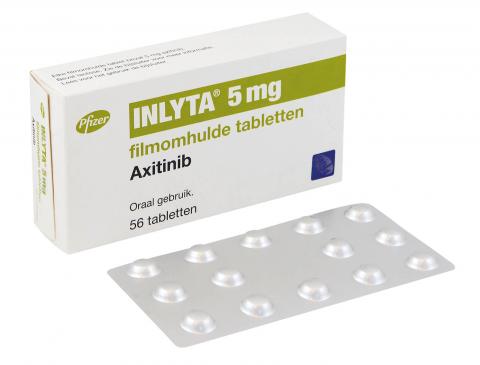Keytruda (pembrolizumab) vs Inlyta (axitinib)
Keytruda (pembrolizumab) vs Inlyta (axitinib)
Keytruda (pembrolizumab) is an immunotherapy drug that works by blocking the PD-1 pathway, which helps the immune system detect and fight cancer cells, and is commonly used in various types of cancers, including melanoma, lung, and head and neck cancers. Inlyta (axitinib), on the other hand, is a targeted therapy known as a tyrosine kinase inhibitor that specifically targets certain receptors on cancer cells to prevent their growth and is used primarily in the treatment of advanced renal cell carcinoma (kidney cancer). The choice between Keytruda and Inlyta would depend on the specific type of cancer a patient has, the stage of the disease, the patient's overall health, and the treatment goals, as these medications are not typically interchangeable and are approved for different indications.
Difference between Keytruda and Inlyta
| Metric | Keytruda (pembrolizumab) | Inlyta (axitinib) |
|---|---|---|
| Generic name | Pembrolizumab | Axitinib |
| Indications | Various types of cancers including melanoma, lung cancer, head and neck cancer, Hodgkin lymphoma, and others | Advanced renal cell carcinoma after failure of one prior systemic therapy |
| Mechanism of action | Programmed death receptor-1 (PD-1) blocking antibody | Tyrosine kinase inhibitor that targets vascular endothelial growth factor receptors (VEGFRs) |
| Brand names | Keytruda | Inlyta |
| Administrative route | Intravenous infusion | Oral |
| Side effects | Fatigue, musculoskeletal pain, decreased appetite, pruritus, diarrhea, nausea, rash, pyrexia, cough, dyspnea, constipation, pain in extremity, and headache | Diarrhea, hypertension, fatigue, decreased appetite, nausea, dysphonia, hypothyroidism, cough, and constipation |
| Contraindications | Individuals with hypersensitivity to pembrolizumab or any of its excipients | Individuals with hypersensitivity to axitinib or any of its excipients |
| Drug class | Antineoplastic, immune checkpoint inhibitor | Antineoplastic, tyrosine kinase inhibitor |
| Manufacturer | Merck & Co. | Pfizer Inc. |
Efficacy
Introduction to Keytruda and Inlyta in Kidney Cancer Treatment
Keytruda (pembrolizumab) and Inlyta (axitinib) are two medications that have been utilized in the treatment of kidney cancer. Keytruda is an immunotherapy drug that works by helping the immune system to detect and fight cancer cells. It is a type of checkpoint inhibitor that targets the PD-1 pathway. Inlyta, on the other hand, is a tyrosine kinase inhibitor that targets the vascular endothelial growth factor (VEGF) receptors, which are involved in the growth of new blood vessels that tumors need to grow and survive. When used in combination, these drugs have shown efficacy in treating advanced renal cell carcinoma (RCC), the most common type of kidney cancer.
Efficacy of Keytruda in Kidney Cancer
Keytruda has been evaluated in several clinical trials for its efficacy in treating advanced RCC. The drug has demonstrated an ability to improve overall survival and progression-free survival in patients with this disease. In a pivotal trial, patients treated with Keytruda in combination with axitinib had a significant improvement in overall response rate compared to those treated with sunitinib, another standard treatment for advanced RCC. Keytruda's efficacy has led to its approval by regulatory agencies for the first-line treatment of patients with advanced RCC in combination with axitinib.
Efficacy of Inlyta in Kidney Cancer
Inlyta has been used as a second-line treatment for advanced RCC and has shown efficacy in slowing the progression of the disease. When combined with Keytruda, Inlyta has been shown to enhance the anti-tumor activity compared to Inlyta alone or other standard treatments. The combination therapy has been associated with a higher response rate and longer duration of response, indicating that patients can experience a longer period of time without disease progression.
Conclusion on the Combined Efficacy of Keytruda and Inlyta
The combination of Keytruda and Inlyta represents a significant advancement in the treatment of advanced RCC. The synergistic effect of an immunotherapy agent with a VEGF inhibitor has provided a new therapeutic option that can lead to better outcomes for patients with this challenging disease. Clinical trials have consistently shown that this combination improves key metrics such as overall survival, progression-free survival, and response rates. As a result, this combination therapy has become a preferred first-line treatment option for many patients with advanced renal cell carcinoma.
Regulatory Agency Approvals
Keytruda
-
European Medical Agency (EMA), European Union

-
Food and Drug Administration (FDA), USA

-
Health Canada

-
Therapeutic Goods Administration (TGA), Australia

-
Medsafe (NZ)

Inlyta
-
European Medical Agency (EMA), European Union

-
Food and Drug Administration (FDA), USA

Access Keytruda or Inlyta today
If Keytruda or Inlyta are not approved or available in your country (e.g. due to supply issues), you can access them via Everyone.org.
How it works

Make an enquiry
Choose the medicine you want to buy, answer a couple of questions, and upload your prescription to speed things up. We’ll get back to you within 24 hours.


Make an enquiry
Choose the medicine you want to buy, answer a couple of questions, and upload your prescription to speed things up. We’ll get back to you within 24 hours.


Breeze through the paperwork
We'll guide you through the required documents for importing unapproved medicine, ensuring you have all the necessary information.


Get a personalized quote
We’ll prepare a quote for you, including medicine costs and any shipping, administrative, or import fees that may apply.


Receive your medicine
Accept the quote and we’ll handle the rest - sourcing and safely delivering your medicine.

Some text on this page has been automatically generated. Speak to your physician before you start a new treatment or medication.
Let's talk
If you have any questions, call us or send us a message through WhatsApp or email:
Contact us




